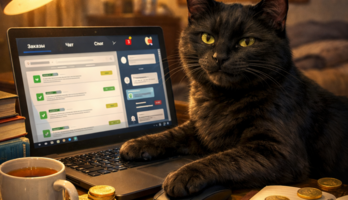flynn_gillian_gone_girl (1) (858987), страница 16
Текст из файла (страница 16)
If things had gone according to my wife’svision, yesterday she would have hovered near me as I read this poem, watching meexpectantly, the hope emanating from her like a fever: Please get this. Please get me.And she would finally say, So? And I would say:“Oh, I actually know this! She must mean my o ce.
At the junior college. I’m anadjunct professor there. Huh. I mean, it must be, right?” I squinted and reread. “She tookit easy on me this year.”“You want me to drive you over?” Gilpin asked.“Nah, I’ve got Go’s car.”“I’ll follow you then.”“You think it’s important?”“Well, it shows her movements the day or two before she went missing. So it’s notunimportant.” He looked at the stationery. “It’s sweet, you know? Like something out ofa movie: a treasure hunt. My wife and I, we give each other a card and maybe get a biteto eat.
Sounds like you guys were doing it right. Preserve the romance.”Then Gilpin looked at his shoes, got bashful, and jingled his keys to leave.The college had rather grandly presented me with a co n of an o ce, big enoughfor a desk, two chairs, some shelves. Gilpin and I wended our way through the summerschool students, a combination of impossibly young kids (bored yet busy, their ngersclicking out texts or dialing up music) and earnest older people I had to assume weremall layoffs, trying to retrain for a new career.“What do you teach?” Gilpin asked.“Journalism, magazine journalism.” A girl texting and walking forgot the nuances ofthe latter and almost ran into me. She stepped to the side without glancing up. It mademe feel cranky, off my lawn! old.“I thought you didn’t do journalism anymore.”“He who can’t do …” I smiled.I unlocked my o ce, stepped into the close-smelling, dust-moted air.
I’d taken thesummer o ; it had been weeks since I’d been here. On my desk sat another envelope,marked SECOND CLUE.“Your key always on your key chain?” Gilpin asked.“Yup.”“So Amy could have borrowed that to get in?”I tore down the side of the envelope.“And we have a spare at home.” Amy made doubles of everything—I tended tomisplace keys, credit cards, cell phones, but I didn’t want to tell Gilpin this, get anotherbaby-of-the-family jab. “Why?”“Oh, just wanted to make sure she wouldn’t have had to go through, I don’t know, ajanitor or someone.”“No Freddy Krueger types here, that I’ve noticed.”“Never saw those movies,” Gilpin replied.Inside the envelope were two folded slips of paper.
One was marked with a heart;the other was labeled CLUE.Two notes. Di erent. My stomach clenched. God knew what Amy was going to say. Iopened the note with the heart. I wished I hadn’t let Gilpin come, and then I caught thefirst words.My Darling Husband,I gured this was the perfect place—these hallowed halls of learning!—to tellyou I think you are a brilliant man. I don’t tell you enough, but I am amazed byyour mind: the weird statistics and anecdotes, the strange facts, the disturbingability to quote from any movie, the quick wit, the beautiful way you have ofwording things.
After years together, I think a couple can forget how wonderfulthey nd each other. I remember when we rst met, how dazzled I was by you,and so I want to take a moment to tell you I still am and it’s one of my favoritethings about you: You are BRILLIANT.My mouth watered.
Gilpin was reading over my shoulder, and he actually sighed.“Sweet lady,” he said. Then he cleared his throat. “Um, hah, these yours?”He used the eraser end of a pencil to pick up a pair of women’s underwear(technically, they were panties—stringy, lacy, red—but I know women get creeped outby that word—just Google hate the word panties). They’d been hanging o a knob on theAC unit.“Oh, jeez. That’s embarrassing.”Gilpin waited for an explanation.“Uh, one time Amy and I, well, you read her note.
We kinda, you know, yousometimes gotta spice things up a little.”Gilpin grinned. “Oh I get it, randy professor and naughty student. I get it. You tworeally were doing it right.” I reached for the underwear, but Gilpin was alreadyproducing an evidence bag from his pocket and sliding them in. “Just a precaution,” hesaid inexplicably.“Oh, please don’t,” I said. “Amy would die—” I caught myself.“Don’t worry, Nick, it’s all protocol, my friend.
You wouldn’t believe the hoops wegotta jump through. Just in case, just in case. Ridiculous. What’s the clue say?”I let him read over my shoulder again, his jarringly fresh smell distracting me.“So what’s that one mean?” he asked.“I have no idea,” I lied.I nally rid myself of Gilpin, then drove aimlessly down the highway so I could makea call on my disposable. No pickup. I didn’t leave a message. I sped for a while longer,as if I could get anywhere, then I turned around and drove the forty- ve minutes backtoward town to meet the Elliotts at the Days Inn.
I walked into a lobby packed withmembers of the Midwest Payroll Vendors Association—wheelie bags parked everywhere,their owners slurping complimentary drinks in small plastic cups and networking,forced guttural laughs and pockets shed for business cards. I rode up the elevator withfour men, all balding and khaki’d and golf-shirted, lanyards bouncing o round marriedbellies.Marybeth opened the door while talking on her cell phone; she pointed toward theTV and whispered to me, “We have a cold-cut tray if you want, sweetheart,” then wentinto the bathroom and closed the door, her murmurs continuing.She emerged a few minutes later, just in time for the local ve o’clock news from St.Louis, which led with Amy’s disappearance.
“Perfect photo,” Marybeth murmured at thescreen, where Amy peered back at us. “People will see it and really know what Amylooks like.”I’d thought the portrait—a head shot from Amy’s brief fling with acting—beautiful butunsettling. Amy’s pictures gave a sense of her actually watching you, like an old-timehaunted-house portrait, the eyes moving from left to right.“We should get them some candid photos too,” I said. “Some everyday ones.”The Elliotts nodded in tandem but said nothing, watching. When the spot was done,Rand broke the silence: “I feel sick.”“I know,” Marybeth said.“How are you holding up, Nick?” Rand asked, hunched over, hands on both knees, asif he were preparing to get up from the sofa but couldn’t quite do it.“I’m a goddamn mess, to tell the truth. I feel so useless.”“You know, I gotta ask, what about your employees, Nick?” Rand nally stood.
Hewent to the minibar, poured himself a ginger ale, then turned to me and Marybeth.“Anyone? Something? Anything?” I shook my head; Marybeth asked for a club soda.“Want some gin with it too, babe?” Rand asked, his deep voice going high on thefinal word.“Sure. Yes. I do.” Marybeth closed her eyes, bent in half, and brought her facebetween her knees; then she took a deep breath and sat back up in her exact previousposition, as if it were all a yoga exercise.“I gave them lists of everyone,” I said. “But it’s a pretty tame business, Rand. I justdon’t think that’s the place to look.”Rand put a hand across his mouth and rubbed upward, the esh of his cheeksbunching up around his eyes.
“Of course, we’re doing the same with our business, Nick.”Rand and Marybeth always referred to the Amazing Amy series as a business, whichon the surface never failed to strike me as silly: They are children’s books, about aperfect little girl who’s pictured on every book cover, a cartoonish version of my ownAmy. But of course they are (were) a business, big business. They were elementaryschool staples for the better part of two decades, largely because of the quizzes at theend of every chapter.In third grade, for instance, Amazing Amy caught her friend Brian overfeeding theclass turtle.
She tried to reason with him, but when Brian persisted in the extra helpings,Amy had no choice but to narc on him to her teacher: “Mrs. Tibbles, I don’t want to be atattletale, but I’m not sure what to do. I’ve tried talking to Brian myself, but now … Iguess I might need help from a grown-up …” The fallout:1) Brian told Amy she was an untrustworthy friend and stopped talking to her.2) Her timid pal Suzy said Amy shouldn’t have told; she should have secretlyfished out the food without Brian knowing.3) Amy’s archrival, Joanna, said Amy was jealous and just wanted to feed theturtle herself.4) Amy refused to back down—she felt she did the proper thing.Who is right?!Well, that’s easy, because Amy is always right, in every story. (Don’t think I haven’tbrought this up in my arguments with my real Amy, because I have, more than once.)The quizzes—written by two psychologists, who are also parents like you!—weresupposed to tease out a child’s personality traits: Is your wee one a sulker who can’tstand to be corrected, like Brian? A spineless enabler, like Suzy? A pot-stirrer, likeJoanna? Or perfect, like Amy? The books became extremely trendy among the risingyuppie class: They were the Pet Rock of parenting.
The Rubik’s Cube of child rearing.The Elliotts got rich. At one point it was estimated that every school library in Americahad an Amazing Amy book.“Do you have worries that this might link back to the Amazing Amy business?” Iasked.“We do have a few people we thought might be worth checking out,” Rand began.I coughed out a laugh. “Do you think Judith Viorst kidnapped Amy for Alexander sohe wouldn’t have any more Terrible, Horrible, No Good, Very Bad Days?”Rand and Marybeth turned matching surprised-disappointed faces toward me. It wasa gross, tasteless thing to say—my brain had been burping up such inappropriatethoughts at inopportune moments. Mental gas I couldn’t control. Like, I’d startedinternally singing the lyrics to “Bony Moronie” whenever I saw my cop friend.
She’s asskinny as a stick of macaroni, my brain would bebop as Detective Rhonda Boney wastelling me about dragging the river for my missing wife. Defense mechanism, I toldmyself, just a weird defense mechanism. I’d like it to stop.I rearranged my leg delicately, spoke delicately, as if my words were an unwieldystack of fine china. “I’m sorry, I don’t know why I said that.”“We’re all tired,” Rand offered.“We’ll have the cops round up Viorst,” Marybeth tried. “And that bitch Beverly Clearytoo.” It was less a joke than a pardon.“I guess I should tell you,” I said. “The cops, it’s normal in this kind of case—”“To look at the husband rst, I know,” Rand interrupted. “I told them they’re wastingtheir time. The questions they asked us—”“They were offensive,” Marybeth finished.“So they have spoken with you? About me?” I moved over to the minibar, casuallypoured a gin.













